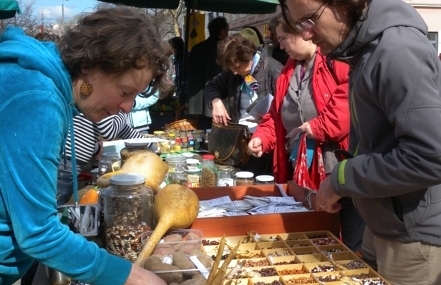10/10/2013, 15:21
Zastupnici Europskog parlamenta kritizira prijedlog novog propisa EU sjemena / MEPs criticize proposal for new EU seed regulation
Prethodno priopćenje: Ako netko želi prevesti sljedeći tekst na hrvatskom jeziku, pošaljite mi molim te, a zatim ga poslati na svim potpisnicima peticije.
The Campaign for Seed Sovereignty recognizes the criticism of the proposed EU seed regulation (www.seed-sovereignty.org/PDF/EU_COM_proposal_PRM_en.pdf) following the statements by some MEPs in the AGRI committee of the EU-Parliament.
In their meeting on Monday, the 30th of September Martin HÄUSLING (Greens/EFA; Germany), Ulrike RODUST (S&D; Germany), Britta REIMERS (ALDE; Germany) and Karin KADENBACH (S&D; Austria) took the floor and criticized the strengthening of the concentration in the seed market and the large number of delegated acts. They asked for the deregulation of small producers, and for the transparency of breeding methods.
John Stuart AGNEW (EFD; UK) stressed the need for the exclusion of private persons from the scope of the regulation. Marc TARABELLA (S&D; Belgium) asked for free of seed exchange between farmers. Georg LYON (ALDE; UK) asked if the new regulation would really be a simplification.
Very in favor of the proposed regulation was rapporteur Sergio SILVESTRIS (EPP; Italy) and Herbert DORFMANN (EPP; Italy). Astonishingly both seemed unable or unwilling to differentiate between registration of varieties and the certification of PRM-lots. Even the shadow rapporteur Luis Manuel CAPOULAS SANTOS (S&D; Portugal) pledged his support for the proposal, who chose to focus on the identity of varieties and sanitary aspects, both issues referred to by Silvestris in his reply to the statements of the other MEPs.
Officer POUDELET of the DG SANCO from the EU-commission clarified the point of farmers seeds: “If a farmer is selling seed to another farmer, in other words there is a sale involved with a profit motive, than clearly he has got to go through the certification hoops”. This intensification of control over farmers seeds was an issue addressed by the Campaign for Seed Sovereignty just before the AGRI-meeting.
Watch the video of the meeting with an English translation here bifurcatedcarrots.eu/euparl/agri30sept_en.wmv or request a link for download in Croatian via: www.europarl.europa.eu/ep-live/hr/committees/video?event=20130930-1500-COMMITTEE-AGRI (A=16:06:25; B=17:02:00)
On 24th of November the seed regulation will be again on the agenda of COM-AGRI. It is important to send strong messages to the members of the committee with our demands; the scope of the regulation has to be the marketing of seeds above certain limits, farmers seeds and seeds of diversity varieties have to be excluded from the scope of the regulation, organic varieties need special registration procedures and we demand transparency concerning modern breeding methods!
Jaki Zabrinutost zbog prijedloga / Strong concerns over the proposal
For the first time not only is the marketing of seeds in the scope of the European seed law, but also potentially the production of seeds. The effect would be that farms and nurseries, which are producing seeds for themselves of for the exchange with their neighbors, are under the regulation and would be obliged to keep information on many of their activities (paragraphs 6 – 8 of the proposal). This would be a heavy burden, especially for subsistence farming in eastern and southern Europe. It's very important for all farmers to have the ability to resow their own seeds, without legal barriers or administrative burden.
Besides this, a regulation would have much more impact than the current directives. A European regulation doesn't leave space for local interpretation or implementation, so it's not possible to adopt it to specific demands of the agricultural structures in member states.
Furthermore the basic problem of the reform of the EU seed law is the preferential treatment of highly homogeneous and highly stable DUS varieties. These varieties are adopted to agrochemicals and to the processing conditions of the food industry, which demand uniform, transportable and storable crops. This will only cause further contraction of agricultural biological diversity in Europe.
This change in seed policy should focus on the support and stimulation of real diversity in seed varieties. Important are varieties which are adopted to the regional conditions of soil and climate, those suited to home and artisanal processing, as well as those which provide a diversity of tastes and have a broad genetic base. To continue the current principles of seed legislation, to extend the scope of the seed law and to keep the DUS varieties as a standard, would mean the acceleration of the erosion of agricultural biodiversity, and put the nutritional basis for the coming age into jeopardy.
Andreas Riekeberg
Campaign for Seed-Sovereignty
www.seed-sovereign



